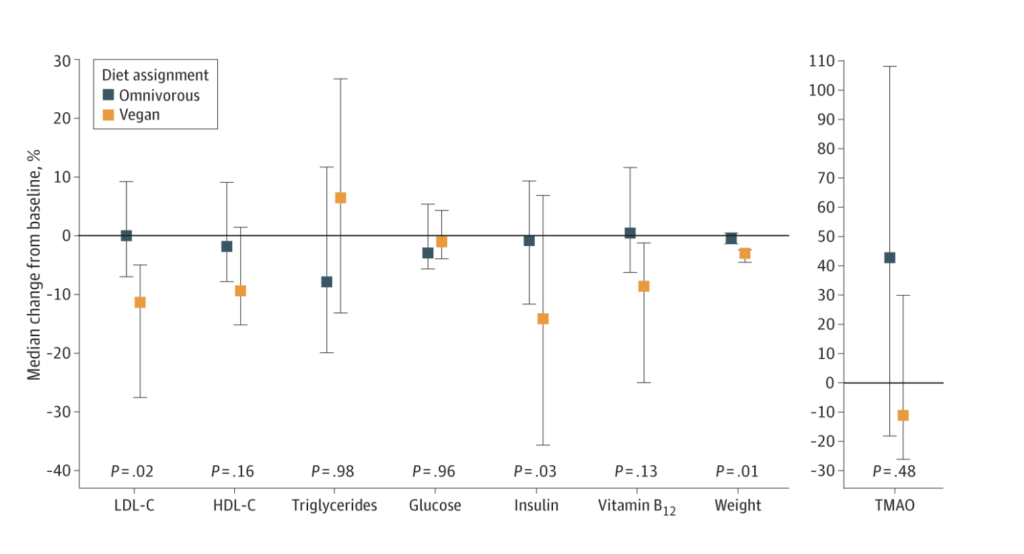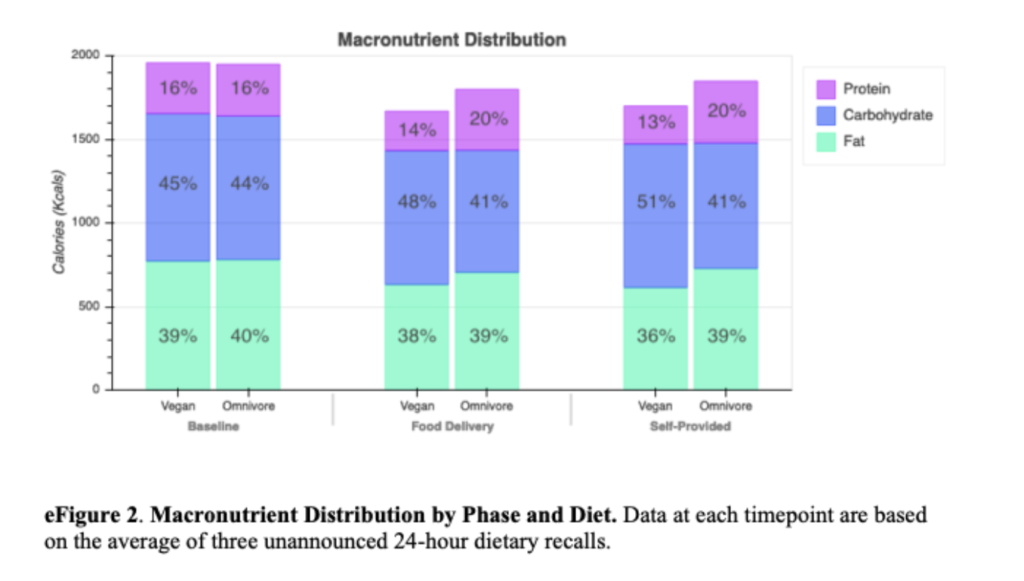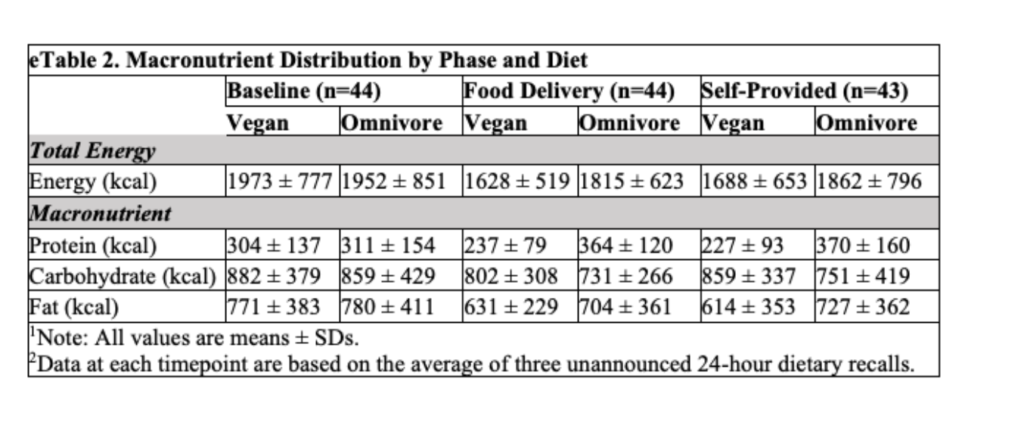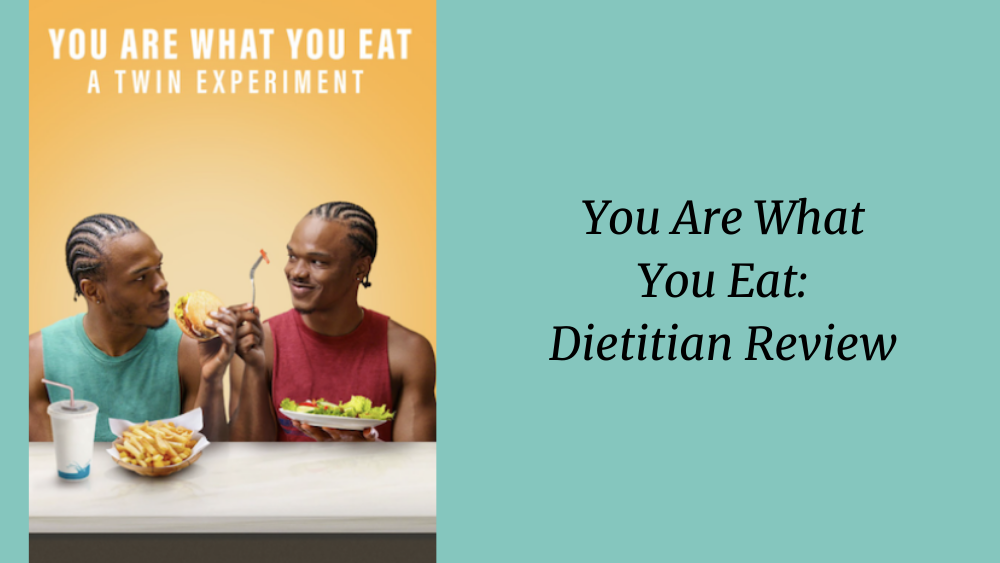Another day, another Netflix documentary trying to scare us all. Are we surprised? Not in the slightest. This time, we’re talking about the “You Are What You Eat” documentary.
“You Are What You Eat” is the latest food and nutrition-related documentary that is striking fear in the hearts of impressionable minds, spreading misinformation about foods that are perfectly safe, and turning a bad science experiment into an emotional roller coaster.
As a Registered Dietitian (RD/RDN), I had a lot of questions, concerns, and disagreements while watching this Netflix special.
Let’s dive into this “You Are What You Eat” review, shall we?
What Is “You Are What You Eat?”
The “You Are What You Eat” documentary is a 4 episode special following 4 of the 22 twin pairs who partook in this Stanford Medicine study. The study wanted to know what differences there would be after participants were on a vegan diet vs. omnivore diet for 8 weeks.
Of note: there were a lot of vegan people working on this project. The director is vegan, the featured scientist/researcher Chris Gardner is “mostly vegan” and also receives money from Beyond Meat, a vegan food company (see: funding/support in article linked), and most of the personalities interviewed in the series are vegans.
While this does not necessarily impact the findings of the documentary, it is important information to keep in mind while watching this special and reading the rest of this review.
The Stanford Twin Study
The Stanford Twin study (published here) examined 22 pairs of twins (21 of which completed the study) for 8 weeks. Each twin was assigned either the vegan diet or a (generally healthy) omnivore diet and were asked to follow that diet for the duration of the study.
For the first 4 weeks, all the meals were provided to the twins by a meal service. For the final 4 weeks, the twins were told to prepare their own meals (while still following their given diet) in order to better simulate a real-life scenario.
As shown in the documentary, many measures were taken multiple times during the study to assess health changes. Basic anthropometrics such as weight, waist size, body fat %, muscle mass, and visceral fat were taken. Researchers also measured basic blood values such as fasting glucose, vitamin b12 levels, Trimethylamine N-oxide (TMAO), cholesterol (LDL, HDL, Triglycerides), and insulin.
What did the study actually find?
The reported findings of the actual study (not what they showed in the documentary) found a significant decrease in LDL (“bad” cholesterol) levels for the vegans. However, there was also a reduction of HDL’s (“good” cholesterol) and an increase of Triglycerides (which are notorious for raising the risk of heart disease and pancreatitis).
This honestly negates the positive findings of LDLs being lowered because it came at a cost. The omnivores didn’t have much change in their LDLs or HDLs, but they did see a significant drop in triglycerides.
Surprisingly, as you can see from the graph below, the participants didn’t see significant changes in weight. The vegans had a slight decrease, but not a significant amount.

The issues in study design
In discussing the limitations of this study, I don’t even know where to begin. This study is so poorly designed and reeks of an agenda. When you actually look at the data and ignore all the narratives, this study did not prove that a vegan diet was superior or improved cardiometabolic health. However, if you read any of the publishings and/or interviews, you would think it was the most magical solution ever.
But even if it did show significant improvements in the vegan participants’ health markers, it wouldn’t matter much because there were so many variables that were not controlled for – basically ruining the quality of this study and our ability to trust its results.
For one thing, calories. Why is there no discussion of how many calories were given to each respective group? Were they given enough food for maintenance, or were they in a calorie deficit?
Another thing is macronutrient distribution. In the supplemental materials accompanying the published study, they include more information about macronutrients consumed among the participants.
Interestingly, they snuck in the information about the overall energy intake that I was curious about (see chart below), so we actually do have an answer to my question above. However, I wouldn’t be able to find that answer if I was searching for it. I only came across it by accident, which is sketchy. Why don’t they want people to know the calorie intake of the participants? Ah, maybe because the vegans were consuming an average of 200 calories less than the omnivores.


Anyway, back to macros. As you can see from the chart above, the omnivores were consuming about 127 more calories from protein than the vegans (which is ~32 grams more). The vegans were also consuming more carbohydrates and less fat than the omnivores.
If you want to design a study examining the impact of a vegan diet vs an omnivore diet on cardiometabolic health, control the macronutrient distribution and calories. Both diets should have had the same distribution of calories across macronutrients, full stop. Now we don’t know if any changes are because of the foods being plant-based or because they were eating less protein, less fat, and more carbs. sigh
Additionally, this was only an 8-week study. That is a very short study. A quality-designed lifestyle intervention study should be at least 6 months, but ideally 1+ years.
The last thing I’ll bring up (because I need to stop at some point) is that the sample size was small. You cannot generalize results from a study on 42 people to the whole world.
Differences Between the Documentary and The Study
If you watch the “You Are What You Eat” documentary, you should know that there is a big difference between what is shown vs what the study actually examined. In the documentary, they examined VO2 max, sexual arousal (in women participants only), cognition, biological age via DNA analysis, and took stool samples to look at gut microbiome.
However, in the published paper, there are no reports about these measures and the results they found. Why did they make such a big deal in the documentary about all the different measures if they weren’t even included in the study’s report?
Additionally, the documentary showed participants engaging in an exercise program (P.S. have you seen my review on BODi, formerly Beachbody?). However, the exercise was not disclosed in the published study. This is a huge research no-no. You must report all variables that could impact the results to have the most unbiased, accurate report possible.
The Problems With “You Are What You Eat”
I already mentioned the problems I had with the study design itself, but now I want to talk about the issues I walked away from the Netflix documentary with.
Questionable Claims
There are a TON of claims being made left and right during this documentary. Reviewing them was the main goal of my “You Are What You Eat” review. Here’s a few that sent my head spinning that I’d like to address:
Claim: The standard American diet is the #1 cause of death in the U.S.
Fact check: Heart disease is the #1 cause of death in the U.S., which yes is impacted by diet, but not solely because of diet. This was a preposterous oversimplification.
Claim: Cheese is “bad”
Fact check: Cheese is very nutritious and contains high levels of protein, calcium, fats, vitamin B12, zinc, and more. In fact, this meta analysis of 33 studies showed for every 20g cheese/day, risk of coronary heart disease went DOWN by 4%. This may be in part due to the calcium content, which calcium helps lower blood pressure and reduce platelet aggregation.
The inverse relationship between cheese consumption and CVD risk was further shown in this meta analysis of 15 prospective studies. Researchers continue to agree that “cheese and full-fat yogurt do not exert detrimental effects on insulin sensitivity, blood lipids, and blood pressure nor increase cardiometabolic risk and may even protect against CVA and T2DM. So perhaps the saturated fat in dairy products is not of concern.
Claim: Too much meat puts you at risk for heart disease, cancer
Fact check: This one is based on a nugget of truth. This meta analysis on 148 studies found red meat consumption increases the risk for lots of cancer anywhere between 10-20%. BUT adding 150g fiber/week seems to NEGATE the cancer risk from red meat as seen in this meta analysis of 25 studies. In another meta analysis of 10 prospective studies, researchers suggested that every 10g fiber could potentially reduce the risk of colorectal cancer by 10%.
Therefore, while it’s true that too much meat can increase your risk for colorectal and colon cancer, if someone is consuming an adequate amount of fiber in their diet – this should negate the risk. The tricky part is that we’re assuming someone is consuming enough fiber. Considering 95% of Americans do not consume the recommended amount of fiber, meat consumption causing cancer is a legitimate concern – it’s just lacking context.
Claim: Dairy is unnecessary or harmful
Fact check: This GIANT umbrella review of over 41 meta analyses show that for every 200 ml of milk (less than 1 glass) led to lower risk of many diseases such as CVA, stroke, HTN, colorectal cancer, metabolic syndrome, obesity, osteoporosis, T2DM, and Alzheimers.
In support of this, a meta analysis of 27 studies showed that as total dairy intake goes up, risk of stroke and CVA disease goes DOWN. Controlled studies are also showing dairy can be anti-inflammatory (meta analysis of 11 RCTS, meta analysis of 16 intervention studies, and a systematic review of 52 clinical trials). Lastly, this report shows dairy to have a neutral or even positive effect on CVA outcomes.
Potential downsides of dairy intake may be an increased risk for prostate cancer, Parkinson’s disease, and acne. However, we need more research to confirm.
Claim: We don’t need meat or dairy to get enough protein.
Fact check: As a reminder, protein is essential for all bodily functions, enzymes, hormone function, and muscle growth. Humans need at least 0.8/kg protein for overall health, up to even 1.3g/kg for muscle growth, and potentially 2.2g/kg (depending on the report… there still seems to be a lot of disagreement among scientists about optimal protein intake).
It’s certainly not imperative to have meat and dairy just for the sake of getting enough protein, but we have to be honest about the fact that it is more difficult to get enough protein from a vegan diet, and individuals have to be intentional about what they eat so they are sure to get all 9 amino acids.
As an aside for any vegans/vegetarians reading this, I found this cool article on how to get all 9 amino acids through eating vegetarian foods. This shows you which foods to pair together so that you get all your aminos – I wanted to share in case someone finds this helpful.
Lack of Context
I’ve already alluded to this, but I want to take a moment and especially highlight the lack of context this documentary has. There are so many things not explained, disclosed, or flushed out the way they should be which ultimately leads people to draw specific conclusions that are misguided.
It’s frustrating as a nutrition professional to watch something like this and know how many things they are leaving out because I know that 95% of people watching this will not know how many things are being strategically left out.

Food Shaming
I can’t even begin to describe how much shaming goes on in the “You Are What You Eat” documentary. From shaming women for their weight to shaming meat farms, and shaming Americans for their diet to shaming anyone who eats meat because it’s allegedly causing “smoke to go up in the Amazon forest” – this was just one big shame fest designed to make you feel like sh*t.
I’m not an expert on farming or agriculture, so I feel ill-equipped to speak on the topic of how they portrayed meat production and farming. For all I know, what they were showing was completely legitimate. However, I suspect that they were showing the worst of the worst and (once again) leaving out a huge amount of context.
Elitism
There is an undertone of blatant elitism in this documentary that we need to talk about. In the show, they do discuss the issue of food deserts in America and how many marginalized, low socio-economic status communities do not have access to fresh foods. I’m glad they brought that up, because it is a big issue.
However, despite that, they continued to show a cheese company, Miyoko’s, that sells vegan cheese for double the price of conventional, and shame individuals for not eating vegan. Interestingly, a follower of mine had reached out after I posted about this documentary and clued me in about an interesting tidbit on the Miyoko’s founder, Miyoko Schinner. She was fired from the company and subsequently sued in February of 2023.
Regardless, Miyoko’s expensive “cheese” products still exist. Not only are there food deserts where individuals literally do not have the option to be vegan, but there are so many vegan products out there with a massive markup. Eating a vegan diet isn’t necessarily more expensive, but it easily can be if someone wants to buy vegan swaps for non-vegan foods.
We also have to consider any supplements that vegans need to take to account for any missing nutrients in their diet such as B12 or protein. This can add up quickly (and will – the supplement industry is projected to be worth $60 billion by 2025).
It’s fine to talk about the benefits of a plant-based diet, but don’t shame people into thinking they’re ruining their health and the economy when they literally don’t have any other option.
One-Sided Commentary
As mentioned earlier, there were a lot of vegan people working on this project. The director is vegan, the featured scientist/researcher Chris Gardner is “mostly vegan” and also receives money from Beyond Meat, a vegan food company, and most of the personalities interviewed in the series are vegans, including a senator who shared his personal testimony.
Many of the opinions shared were just that – opinions. At no point were there references to studies backing up their claims or supporting the personal experiences expressed as applying to others.
Anecdotal stories (such as the senator’s) are powerful, but it absolutely cannot be generalized to everyone. Anecdotes often lead us to research something more in-depth, but it is not the same thing as what research then tells us. This documentary did not care about the fact that anecdotes are not facts. Instead, it played on human emotions.
Vegan Diet vs Omnivore Diet: Which Is Better?
The documentary will make it seem like a vegan diet is of course better. Now I want to be clear – I have nothing against a vegan diet. However, I do have something against people making false claims and trying to convince people they should be vegan by scaring them sh*tless.
I’m going to do what the documentary should have done and lay out some pros and cons so you can decide what’s best for you.
Pros and Cons of a Vegan Diet
Pros:
- Rich in fiber and heart-healthy fats.
- Can be cheaper as protein sources are typically the most expensive part of a meal.
- Many individuals report feeling better after eating a vegan diet.
- May be more sensible for the environment.
- I would imagine that animals certainly like when people are on a vegan diet
Cons:
- May require some more time in the kitchen / advanced cooking skills to make vegan food appetizing.
- Difficult to adhere to (see above)
- May be more costly if purchasing a lot of marked-up vegan products
- Can be a challenge in social situations
- Difficult to get enough protein and to include all 9 essential amino acids
- With so much volume/fiber from the fruits and vegetables, vegan meals are generally lower in calories which may not be desirable
Pros and Cons of an Omnivore Diet
Pros:
- Easy to adhere to
- Easier to get enough protein, B12, calcium, and other nutrients that are high in animal products.
- No limitations in social situations (you can eat what everyone else is having)
- Accessible
Cons:
- Potential risks for colorectal and colon cancer, though an adequate amount of fiber can negate those risks.
- Easier to have a high intake of saturated fat (and typically sodium as well) which may heighten the risk for cardiovascular disease.
What Is a Healthy Diet?
A truly healthy diet is going to vary from one person to the next. For example, one person may find a vegan diet to be easy to adhere to, well within their budget, and they have no problem meeting their nutritional needs.
On the other hand, another individual may find that same diet cumbersome, therefore making adherence difficult and psychologically distressing. They may reach diet fatigue and then binge on all sorts of food as a result of already-being-bad-so-I-might-as-well-enjoy-it-now-and-just-start-over-tomorrow.
Generally speaking, a healthy (read: health-promoting) diet for you needs to be realistic, sustainable, and something that increases your overall sense of well-being – not only physically, but mentally as well.
I realize that isn’t a black-and-white answer, but that’s exactly why it’s the right one because our health is not black and white.

Final Verdict: Is the “You Are What You Eat” Netflix documentary accurate?
The “You Are What You Eat” documentary essentially lied to millions of people. It tossed out questionable (if not completely absurd) claims, inflated the results (and methods) of a poorly designed research study, and spread a thick coat of shame over a solid piece of propaganda toast.
So what’s the final verdict of my “You Are What You Eat” dietitian review? I do not recommend… Unless you want to laugh along with me at how ridiculous it was.
If you struggle with binge eating or emotional overeating, jumping onto another diet bandwagon (like a shame-motivated vegan diet) is not the answer. You’ll need to get to the heart of your relationship with food in order to see lasting freedom. To learn more about how to do this, go HERE.

